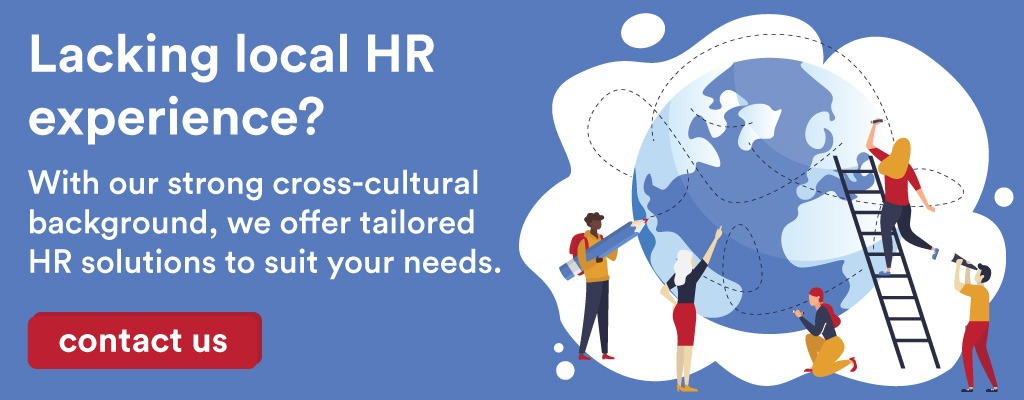There are many advantages to outsourcing your human resources function, especially when you’re a foreign company looking to explore a new market or expand to a new country.
While it might initially seem counterintuitive to let a third-party vendor handle a business area as interpersonal as HR, outsourcing it doesn’t actually take away from the human aspect.
Outsourced HR companies specifically target tasks that are administrative and difficult to manage — things like running accurate payroll, administering benefits, ensuring HR compliance or conducting redundancies — so you can stay focused on your people, your business’ core competencies as well as your expansion plans.
With all of the critical responsibilities that fall on the HR team, it isn’t surprising that outsourcing this essential function is growing in popularity. In fact, HR sits among some of the top outsourced departments behind finance and IT!
Whilst entrusting this crucial aspect of your business to a specialist offers many benefits, choosing the wrong partner can be detrimental to your business.
So when you’re ready to outsource your HR and choose a partner, we recommend asking the following key contextual questions so as to make a more informed decision.
10 Questions To Ask
1. What is included in their HR Outsourcing service?
An HR department has many functions and can wear many hats. However, when it comes to outsourcing your HR department, 3rd party partners tend to offer help with workplace health and safety, employee relations, compensation planning, labour law compliance, training, payroll administration and drafting company policies.
Although these are recurring HR responsibilities, one should not assume all HR 3rd party partners offer these services. With that in mind, we recommend making sure the partner you choose offers a large variety of services, even if you may not need all of them at the present time.
You don’t know what you don’t know but an HR provider who is aware of your goals should be able to help you forecast, or at least highlight needs that may arise.
2. Do they offer any additional support services, and if so, what are they?
Although an HR provider’s main mission is to support you with your HR needs, enquiring about other services they may offer outside of this scope could be handy.
You never know what you might need down the track once you’ve set-up in a new country, so working with a partner that offers more than just HR advisory can save you time and money in the long run.
Examples of complimentary services HR providers sometimes offer include recruitment, payroll outsourcing, Employer of Record services (EOR / PEO), immigration & VISA assistance, etc.
Benefits to centralising all of these services under one roof include:
– Better inter-department communication so as to minimise the risk of errors.
– Access to one point of contact for all of your needs rather than having to liaise with multiple different partners. This in turn renders you more efficient.
– Often more affordable packages / bundles as costs are unified.
3. How do they deliver their service?
Given that the HR department is critical to the functioning of the company, having an in-depth understanding of how your partner will be handling it is paramount.
First off, ask how and who will be taking care of it internally:
– Will you have a dedicated HR advisor / one point of contact? or
– Will you need to contact different advisors depending on the HR matter?
In this instance, one option isn’t necessarily better than the other, however knowing how they conduct their service in advance should minimise any miscommunication or surprises.
Speaking of surprises, it shouldn’t come as one that more and more businesses are turning towards remote working post COVID-19. Knowing this, you’ll want to make sure the provider you choose is properly set up and has experience using remote systems.
With that in mind, we also recommend enquiring about how the partner conducts in-person meetings / matters (such as workplace investigations or redundancies) and where they take place. Whilst remote working has grown in popularity (and become a necessity for some), there are still some matters that are best dealt with in person.
4. What technology do they use when outsourcing, and is there an additional cost for you to access it?
Whilst the HR function focuses on the human aspect of a business, it can still benefit from using technology to its advantage. In fact, most outsourcing companies use software as part of their service so as to:
– Keep employee information organised and centralised
– Automate manual tasks
– Assist with tasks like time tracking
– Update employee directories
– Oganise & store performance management data and
– Create data-driven reports
Most systems are now cloud-based, subscription-based, easily integrated with other data management programs, and highly customisable to an individual organisation’s needs, goals, and budget.
Whilst most HR outsourcing companies use software in-house, not all of them give their clients access or set them up to use the tool themselves. As such, best to enquire about what software each partner uses internally and if access is possible.
Although this often comes at an extra cost, having access to software is a huge plus, rendering you more independent, by giving you access to data you would otherwise not be privy to as easily, as well as giving you clarity on your teams overseas at the drop of a hat.
5. How do they stay current on compliance issues, and how would they communicate those to you?
As a professional HR services provider, it is their responsibility to stay on top of local legislation changes on your behalf. Whether that be through local government channels or by being members of local HR associations, your chosen partner should be able to tell you how and where they get their information.
It’s also important to ask them how they’ll communicate this with you so you may stay on top of your notifications and act upon them accordingly. Typical examples include:
– Ad-hoc emails
– Quarterly newsletters
– Blog posts
– In app messaging (if you’ve opted to use HR software), etc.
6. What is their experience with international companies?
One of the main reasons foreign businesses tend to outsource key business functions such as their HR & Payroll is due to a lack of local experience.
This implies that their headquarters are located in a different area of the world, in a different time zone, with a different culture. This also means that their employees, whether locals or expatriates, may face cross-cultural challenges that are common in these types of situations.
With that in mind, choosing a partner who has experience dealing with cross-cultural business and international teams is not only a plus, but is highly recommended. This will not only positively impact your operations but also your employee engagement.
To check if your HR providers of choice have experience working with international companies, we recommend you refer to their “testimonial” or “success story” section on their website, as well as ask for a few client references that you could reach out to directly.
7. What pricing model do they use?
Generally speaking, HR outsourcing partners offer 2 types of pricing models: ongoing and ad-hoc.
An ongoing partnership is often paid for in monthly installments and dictated by an agreement where you and your partner will agree on a scope of service. There is usually a minimum commitment and this type of pricing is often based on the number of employees you have. This model often suits companies who have a broad HR need and little, sometimes even no in-house HR support.
On the other hand, the ad-hoc model mostly suits companies that have a specific need at a given time (for instance, the creation of an employee handbook). In this case, the pricing will depend on the size of the project and its end goal.
Choosing one or the other doesn’t prevent you from changing or using both when the need arises. However, in order for you to get more value, it’s wise to discuss your needs in detail prior.
8. How flexible are they with agreement terms should your needs change?
We know too well that nothing is ever certain and that plans can often change.
By nature, companies have evolving needs; whether it is because their team grows, their strategy evolves or they decide to restructure. The needs you have today will most likely not be the same in a year from now. In fact, if the COVID-19 pandemic has shown us anything, it’s that change can happen at the drop of a hat.
This is why, regardless of your needs at a given moment, it is essential to think ahead and look at all possibilities. The HR partner you choose should be able to grow alongside you and provide you with the support you need, now but also later.
Questions to ask include:
– What are their minimum commitment terms once an agreement is signed?
– Will they be able to support you and adjust the contract if you grow your workforce earlier than planned?
– And conversely, what happens if you can no longer afford the services or decide you no longer need them?
9. How do they ensure data privacy & security?
In today’s day and age, data security is paramount. In fact, in an increasingly digitised world, businesses hold a phenomenal amount of sensitive personal data, both from clients / customers as well as employees.
As such, ensuring that the provider you choose has systems and processes in place to handle sensitive data is crucial, not only for your people but also for your business.
If you’re looking to expand to Europe, you’ll be glad to know that HR providers with a local presence there are bound by “the General Data Protection Regulation” (GDPR), which came into effect in 2016. But what about other countries?
As part of the selection process, we recommend inquiring about the ways your top HR partner choices follow data security requirements for their clients, as well as for employees, in each country. Similarly to partnership agreements, HR outsourcing providers should be able to answer these questions with complete transparency. If they don’t, you should consider this a red flag.
10. What sets them apart from others on the market?
Comparing service providers side by side isn’t as easy as one might think. After sifting through their marketing speel, evaluating their unique selling proposition and service capabilities, it can get difficult to sift through the noise. So why not ask them directly?
In this instance, we recommend asking more specific questions such as:
– Why do clients stick with them?
– How has their service offering evolved in the past few years and why?
– How would clients describe their services and ways of working?
Advantages of HR Outsourcing
When expanding to a new country or exploring a new market, there are many operational aspects to think about. This is where outsourcing your HR comes in handy. Not only does it offer you peace of mind that things will be handled in the best possible and compliant way, but it also enables you to focus on your core operations.
Although searching and choosing the right partner is far from easy, you’ll be thankful you took the time to dig a little deeper.













 January 27, 2021
January 27, 2021 








